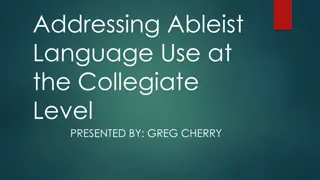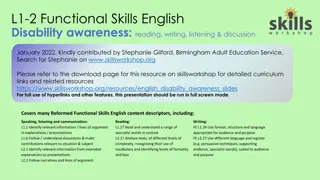
Anti-Ableist Education: Challenging Assumptions and Prioritizing Accessibility
Explore the essence of being an anti-ableist educator, challenging the notion that disabled individuals need to be "fixed" or seen as exceptional. Understand the importance of prioritizing accessibility over cures and supporting the full potential of all disabled individuals in society.
Download Presentation

Please find below an Image/Link to download the presentation.
The content on the website is provided AS IS for your information and personal use only. It may not be sold, licensed, or shared on other websites without obtaining consent from the author. If you encounter any issues during the download, it is possible that the publisher has removed the file from their server.
You are allowed to download the files provided on this website for personal or commercial use, subject to the condition that they are used lawfully. All files are the property of their respective owners.
The content on the website is provided AS IS for your information and personal use only. It may not be sold, licensed, or shared on other websites without obtaining consent from the author.
E N D
Presentation Transcript
How to Be an Anti-Ableist Educator Amanda Castelli DSPS Counselor Christopher Crone DSPS Director Ian Jones LPC Alumnus Karin Spirn English Instructor
Housekeeping Please write any questions in the chat! We will end the session with a ten- minute Q&A. Download the Disability Microaggressions Handout from the chat! We hope you enjoyed our entry music, Hard Out Here for a Gimp by the awesome band Wheelchair Sports Camp.
Discussion Questions We all have abilities and disabilities! With your group, introduce yourself and then answer the following questions: Describe a disability (a physical impairment, a learning difference, a mental health issue) that you currently have that you would like to be cured or fixed. Why would you like it to be cured? Describe one disability that you currently have that you do not want to have cured or fixed. Why don't you want to be cured of this disability?
Dont Assume Disabled People Want to Be Fixed! Ideology of ability: the assumption that it is always better to be able-bodied than disabled (Tobin Siebers) Non-disabled people may assume that disabled people dislike their disability I hope you can walk someday. She overcame her disability to reach high levels of success. He was tragically born blind.
Non-disabled people project the fear and discomfort they would feel if they suddenly developed that disability, rather than remembering that for most disabled people, their disability is familiar and their norm. In many or most cases, disabled people want accessibility, not cures!
Dont assume that disabled people are exceptional! Many accomplished disabled people adamantly argue that all disabled people could reach their full potential if society prioritized accessibility and support. The narrative of disabilities as tragic circumstances overcome by a few exceptional individuals is so powerful that it s hard for many people to get the message from these leaders. This cultural narrative dismisses the need for increased accessibility in our society.
Susan and I gave several interviews about the movie [Breathing Lessons]. Predictably, the questions focused on my alleged heroism. The conversation with a KGO-TV reporter was typical and exasperating. Near the end of the interview, during which I had discussed the political aspects of disability, she asked me, What special qualities enabled you to get out of the nursing home? She still hadn t gotten it. I exploded. Look, it doesn t matter how brave you are, how intelligent you are. If you re in a nursing home and your state has no provisions for independent living, then you re stuck. I watched the interview later that day. My final outburst had been cut, along with everything else political. Mark O Brien, How I Became a Human Being
Challenge yourself to create a disability story without using the word inspiration. The overuse of the word, especially for the most trivial things, has dulled its meaning. People sometimes even use the word as a disguise for pity. For example, You inspire me to stop complaining about my problems because I should feel grateful I don t have yours. Messages that perpetuate us versus them hierarchies contribute to marginalization. Engage audiences by moving beyond the inspiration cliche. Haben Girma (https://habengirma.com/faq/)
Ideology of Ability/Ableism The ideology of ability is at its simplest the preference for able-bodiedness. At its most radical, it defines the baseline by which humanness is determined, setting the measure of body and mind that gives or denies human status to individual persons. Tobin Siebers, Disability Theory Ableism: prejudice against disabled people
Medical Model of Disability The medical model defines disability as an individual defect lodged in the person, a defect that must be cured or eliminated if the person is to achieve full capacity as a human being. Tobin Siebers, Disability Theory https://www.opendemocracy.net/en/transformation/disabled-people-dont-need-to-be- fixed/ https://www.youtube.com/watch?v=IelmZUxBIq0&t=122s
The Built Environment/Disability as a Social Construct Disability exposes with great force the constraints imposed on bodies by social codes and norms. In a society of wheelchair users, stairs would be nonexistent, and the fact that they are everywhere in our society seems an indication only that most of our architects are able-bodied people who think unseriously about access. Tobin Siebers, Disability Theory https://www.youtube.com/watch?v=7r0MiGWQY2g&t=7s
Social Model of Disability The social model of disability opposes the medical model by defining disability relative to the social and built environment, arguing that disabling environments produce disability in bodies and require interventions at the level of social justice. Tobin Siebers, Disability Theory
Ableism and Microaggressions Wheelchair-bound or confined to a wheelchair Assuming that disabled people dislike their disability (some do, some don t) Suggesting that disabled people would be better off dead (Million Dollar Baby) Assuming that people who only use a wheelchair sometimes are faking disability Calling disabled people inspirational or interpreting their stories as inspirational in a way that dehumanizes them Calling an accomplished disabled person exceptional and implying that other disabled people are less worthy and qualified for success.


